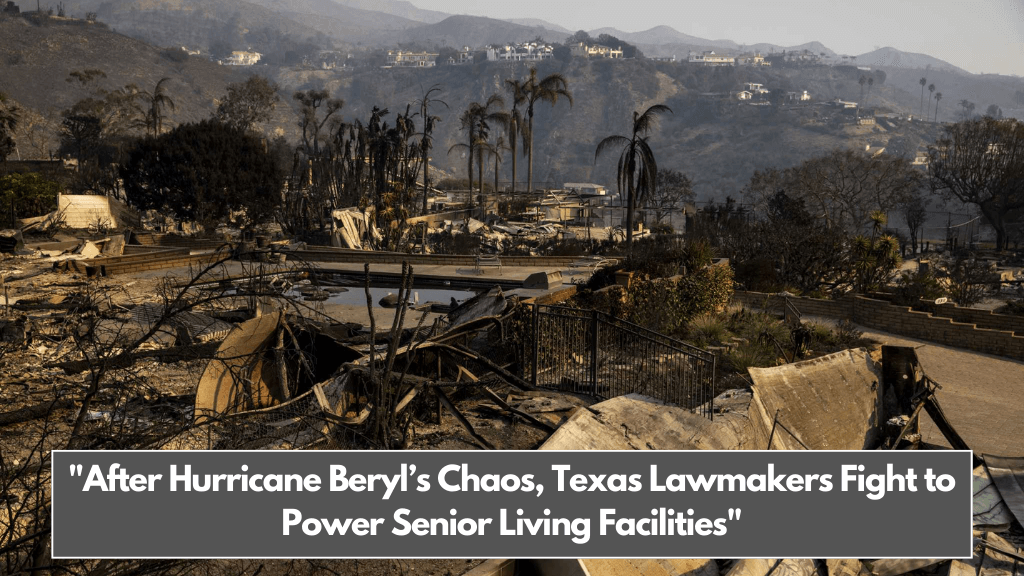Texas lawmakers are pushing for new legislation requiring nursing homes, assisted living facilities, and senior housing to install backup generators to protect vulnerable elderly residents during power outages.
After storms like Hurricane Beryl and other extreme weather events left thousands without power, concerns over the safety of elderly residents have grown. Here’s a breakdown of the proposed bills and the challenges they face.
The Growing Need for Backup Power
Power outages in Texas, especially during hurricanes and extreme weather events, have exposed the vulnerability of elderly residents in long-term care facilities.
Without air conditioning, heating, or power for medical equipment, these residents face life-threatening risks. Lawmakers argue that installing generators in these facilities is crucial to ensuring the safety of the state’s growing senior population.
Proposed Legislation on Backup Generators
Several bills have been filed to address the issue of power outages affecting seniors:
- HB 732 (Sen. Borris Miles, D-Houston): Requires low-income housing for seniors living independently to have backup generators.
- SB 481 (Sen. Carol Alvarado, D-Houston): Mandates that nursing homes and assisted living facilities include emergency plans with backup generators.
- HB 1199 (Rep. Christian Manuel, D-Beaumont): Requires generators in nursing homes and assisted living facilities capable of running for at least 72 hours during power outages.
- HB 1467 (Rep. Suleman Lalani, D-Sugar Land): Calls for backup generators in nursing homes, assisted living, and independent senior housing.
- HB 863 (Rep. Suleman Lalani): Proposes a shared database that lists senior living facilities and their emergency plans, accessible to emergency responders.
- HB 2224 (Rep. Ana Hernandez, D-Houston): Requires backup power for at least one elevator for 48 hours after a power outage, to ensure residents can safely evacuate or access care.
Why Backup Generators Are Critical
Power outages can have severe consequences for elderly residents:
- Health Risks: Without air conditioning, temperatures in Texas can soar above 100°F, posing life-threatening risks to seniors.
- Limited Mobility: Residents using wheelchairs or walkers may become trapped on upper floors if elevators are non-operational.
- Medical Equipment Failure: Devices like oxygen machines and other life-saving equipment rely on consistent power.
Challenges to Passing Generator Legislation
Despite the urgency, past efforts to mandate generators have faced significant pushback, primarily from the long-term care industry.
Cost Concerns
Installing and maintaining generators can be expensive, with costs estimated at $200,000 or more per facility. Some industry leaders argue that such expenses could divert resources away from patient care.
Travis Clardy, head of the Texas Health Care Association, stated that while many nursing homes already have generators, requiring backup power across the board could impose unnecessary financial burdens.
“I think our membership would prefer to see that money channeled into higher-quality care,” Clardy said.
Industry Collaboration and Flexibility
The Texas Assisted Living Association (TALA) supports flexibility in meeting power backup requirements. According to TALA’s vice president of public policy, Carmen Tilton, assisted living facilities can meet state regulations by cooling one room or using portable generators.
“We recognize that everyone’s set-up is a little bit different,” Tilton said.
Rather than a one-size-fits-all approach, TALA advocates for solutions tailored to the specific needs of each facility.
Harris County Takes Action Locally
While state-level efforts continue, Harris County has already enacted a requirement for backup generators in nursing homes and assisted living facilities in unincorporated areas. However, the move has faced criticism from the assisted living industry, which argues that generators are not foolproof.
“Generators do fail,” said Diana Martinez, president and CEO of TALA.
AARP and Advocacy Groups Call for Legal Clarity
AARP Texas is pushing for clearer legal requirements to ensure that healthy temperatures are maintained in all long-term care facilities. Andrea Earl, an associate state director at AARP Texas, said that existing administrative codes are insufficient because they can be easily changed.
“There’s no assurance in law that healthy temperatures will be maintained,” Earl said.
Current Requirements for Emergency Preparedness
Existing State and Federal Rules:
- Texas Law: Since 1996, new nursing homes must have generators that power critical safety systems like emergency lighting, fire alarms, and life-saving equipment.
- Federal Requirements: Nursing homes built after 2016 or those that rely on emergency power for heating and cooling must meet federal generator standards.
- Assisted Living Facilities: These facilities are not currently required to have generators but must have emergency preparedness plans in place.
However, independent senior housing is largely unregulated, leaving many vulnerable during power outages.
As Texas faces more frequent and severe storms, the debate over requiring backup generators in senior living facilities highlights a difficult balance between financial concerns and protecting vulnerable residents. Lawmakers, industry leaders, and advocacy groups are working to find common ground.
The outcome of the proposed legislation will determine whether Texas seniors have better protections during future power outages or if the state continues to rely on temporary measures.
